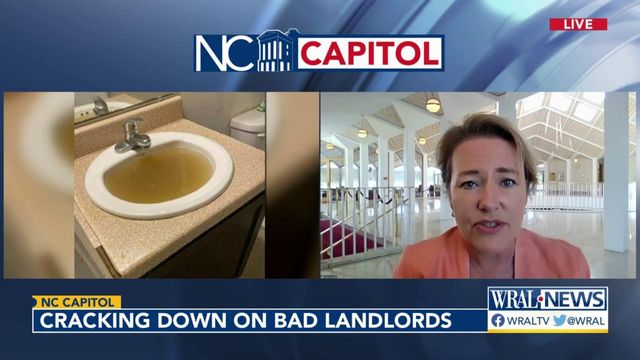Proposed crackdown on bad landlords finds pushback in NC House
Cities in North Carolina would have more power to go after bad landlords under a bipartisan bill that received a House committee hearing this week. But groups representing landlords say it goes too far, and some lawmakers agree.
Rep. Bill Ward, R-Pasquotank, said he filed House Bill 595 at the request of local officials in his district, which includes large areas of high poverty.
“They're reporting situations of substandard living conditions, mold, water intrusion, appliances not working, holes in floors and walls, serious type things - sewer backups, sewer overfills,” Ward told WRAL News.
He said the existing law “didn't give them the enforcement action that they felt that they needed to correct those problems.”
Existing law, Ward said, allows local officials to conduct targeted inspections, but not to take punitive measures like fines or liens, which he said might be necessary to shut down some of these bad landlords.
Speaking to the House Regulatory Reform committee Wednesday, Ward, a landlord himself, said that during his 33-year career in law enforcement, he had "been into residences and apartments and trailers where I would not put a dog. Complaints were actually given to the landlords. The landlords said, ‘You're paying $300 a month. What do you expect? You want the Taj Mahal?’”
Ward distributed photos of unsafe and unsanitary rentals in his district to all the members of the committee, some of whom called them “horrific.”
“Reports went to the county and went to the city, and they said they followed [General] Statute 160A, which did not have any teeth in it. They could not do any enforcement to make them get these residences up to basic standard living codes,” Ward recounted.
Concerns from the committee
Members of the committee, most of whom also said they were landlords, agreed that there’s a problem, but said Ward’s bill might be too broad. It would require landlords to fix problems within 21 days, and allow periodic repeat inspections of properties with two code violations within the past six months or high incidences of crime. Repeat offenders would have to register with the city and could have to pay up to 30% of their rental income to fund the program.
Rep. Deb Butler, D-New Hanover, said the measure needs to make clear distinctions between minor code violations, like peeling paint or too-long grass, and major violations that impact health and safety.

Butler and several other committee members also questioned the automatic inclusion of properties in areas with high crime rates.
“Let's suppose you've got tenants that decide every night there needs to be an outdoor party there," said Rep. Jeff Zenger, R-Forsyth. "Now the landlord's responsible for checking to ensure that there's no outdoor party there every night that's disorderly and having to shoo everybody away? That really seems to be more of a responsibility on law enforcement.”
“We all know that law enforcement can't be everywhere all the time,” Ward responded.
Rep. John Bradford, R-Mecklenburg, who said he used to own an apartment property management company, said there are other sections of current state law that can be used to force landlords to comply with basic health and sanitation requirements.
“A tenant who is being subjected to these photos, you know, they do have rights,” Bradford said. “A resident can bring a landlord in front of small claims [court] no different than a landlord can take a resident to small claims for summary judgment.”
However, Ward pointed out that the low-income people who live in these types of rentals don’t generally have the resources to take a bad landlord to court or to break their lease and find other housing.
“They don’t have the money to go out and rent another apartment, another house, another single wide trailer, and pay two months up front and then a month of damage on top of that. They just don't have it,” Ward said. “They're having to live in squalor - and basically, that's what it is, it's squalor - with landlords who know they have the upper hand.
“I’m a staunch conservative. I disdain government overreach into personal lives,” Ward said. “This is not about a conservative issue. It's not about a liberal issue. This is about doing what's right for our citizens."
Opposition from the rental industry
Ward said he had been working on negotiations with the NC Realtors Association and the Apartment Association of North Carolina. He told the committee he thought they had come to a compromise, but learned “very recently” that they had not.
Sarah DuBose with the Apartment Association of North Carolina told the committee her organization opposes the legislation, particularly the registration and fee requirements for properties with records of violations.
“We all want to get the bad actors out of the business as well,” DuBose told the committee. “But we do believe that local governments do have many of the tools already to really hold those who are breaking the law accountable.”
"Targeted inspections, as currently allowed by law, are a far more effective tool than registration fees for fighting substandard housing," she added in a statement to WRAL News.
Mark Zimmerman with the NC Realtors Association agreed that the problems Ward described are serious, but he agreed with DuBose that current law would already allow the local government to hold those landlords accountable.
“Interestingly, the local government could act now but they've chosen not to. Thus, this may not be the best way to fix the problem,” Zimmerman said.
The committee did not vote on the bill Wednesday. Ward told WRAL News he will continue to meet with industry advocates to try to reach a compromise.
“I just think it's a good bill. I think it's something that we need within our state to ensure that our marginalized citizens are afforded actual minimum standards for housing,” Ward said.













